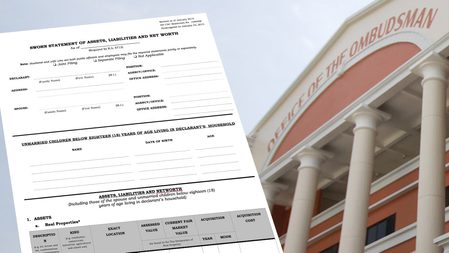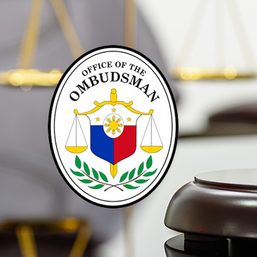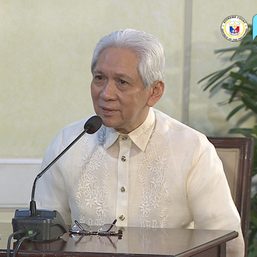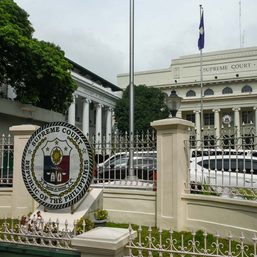SUMMARY
This is AI generated summarization, which may have errors. For context, always refer to the full article.

The Supreme Court recently ruled that custodians of government officials’ Statements of Assets, Liabilities and Net Worth (SALNs) can regulate public access to the documents.
In junking the first known legal challenge to Ombudsman Samuel Martires’ public access restriction to the SALNs of presidents and vice presidents, the Supreme Court said, “While the right of access and information to a public official’s SALN is provided under the Constitution and RA 6713, the same is not an absolute vested right.”
Republic Act No. 6713 is the Code of Conduct and Ethical Standards for Government Officials and Employees.
“A custodian such as the Office of the Ombudsman is not bound under every circumstance to allow or to grant the request of disclosure of a public official’s SALN to the public. A custodian is not prohibited by the Constitution to regulate such disclosure,” the High Court said in a notice of resolution dated February 2, but released only by its Public Information Office (PIO) on June 30.
The released document was only in the form of a notice. The PIO has not yet responded to questions on how the voting went, and who wrote the resolution, as of posting time.
In denying the petition filed by Louis Biraogo on procedural grounds, the Court cited the following:
- There’s no actual case of controversy
- It violated the hierarchy of courts
- It was a wrong resort to the petition for mandamus
Under the doctrine of hierarchy of courts, the petitioner should have resorted to lower courts first before elevating the petition before the Supreme Court.
Biraogo wrote a request to the Office of the Ombudsman to get the SALN of Vice President Leni Robredo. When he received no response, he called the office and was told verbally that the request couldn’t be acted upon because of Martires’ Memorandum Circular No. 1 that makes it impossible for the public to get the SALNs of presidents, vice presidents, and heads of constitutional bodies if the filing official doesn’t consent to the release.
Martires’ memo exempts government investigators who need the SALNs as part of an official probe.
Procedural grounds
The Court said that the verbal denial to Biraogo’s request does not create an actual controversy.
“It bears emphasis that the alleged verbal refusal of respondent to accommodate petitioner’s request is but a bare, self-serving, and unsubstantiated allegation,” said the Supreme Court.
“It also would not suffice for the Court to exercise judicial power by the mere existence or effectivity of Memorandum Circular No. 1, absent acts or events where concrete rights or duties arise,” it also said.
The High Court’s ruling also comes at a time when it is seen to be getting more strict with petitions which invoke transcendental importance, or those which invoke the greater public interest.
“The doctrine of hierarchy of courts, being a constitutional imperative, dictates that direct recourse to this Court is allowed only to resolve questions of law, notwithstanding the invocation of paramount or transcendental importance of the action,” said the Supreme Court.
Article III, Section 17 of Constitution states that SALNs of public officials should be disclosed to the public “in a manner provided by law.” That law, RA 6713, says that SALNs “shall be available to the public for a period of ten (10) years.”
But according to the Court’s notice of resolution, “the Court has declared in the past that while no prohibition could stand against access to official records such as the SALN, the same is undoubtedly subject to regulation.”
It’s discretionary
Martires’ memorandum has enabled President Rodrigo Duterte to keep his 2018, 2019, and 2020 SALNs secret. Vice President Leni Robredo, for he part, has been releasing her SALNs on her own by approving Freedom of Information (FOI) requests from journalists.
Section 8(D)(b) of RA 6713 states: “It shall be unlawful for any person to obtain or use any statement filed under this Act for any commercial purpose other than by news and communications media for dissemination to the general public.”
But the Court said the Office of the Ombudsman’s role is “not merely ministerial.” The Office of the Ombudsman is the custodian of SALNs of presidents, vice presidents, and heads of constitutional bodies.
This is also the reason why the Court said mandamus was the wrong petition, as it is a petition one files to compel a government unit to perform a duty.
“The Court holds that the remedy of mandamus does not lie in this case. The duty subject of mandamus must be ministerial rather than discretionary,” said the Supreme Court.
“The Court, in fact, as custodian of the SALNs of justices and judges, has itself laid down some guidelines to be observed for requests made to gain access to these SALNs,” it added.
The Court also said that it “has likewise, on occasions, denied requests due to a plainly discernible’ improper motive smack[ed] of a fishing expedition.”
The Court promulgated an administrative rule post-Renato Corona that requires requests for SALNs of judges and justices to be approved by the en banc first and on the condition that the requests do not seek to compromise the independence of the judiciary.
The Court used to release summaries of the justices’ SALNs but it has also stopped this practice beginning 2020, covering the 2018 SALNs. In 2019, Rappler requested access to the full SALNs of the justices for 2018 but the request was denied by the en banc.
The Court now requires those who make SALN requests to submit a notarized form.
The High Court’s administrative rule was also the basis of the University of the Philippines (UP) in shelving the request of Solicitor General Jose Calida to get the SALNs of Associate Justice Marvic Leonen when he was professor, then dean, of the UP College of Law.
Even the House of Representatives and the Senate also require notarization of the requesting forms, adding a new layer to the process.
– Rappler.com
Add a comment
How does this make you feel?

![[PODCAST] Law of Duterte Land: Supreme Court and the SALN challenge](https://www.rappler.com/tachyon/2020/10/Law-of-DuterteLand-carousel.jpg?fit=449%2C449)




![[EDITORIAL] Bakit galit tayo sa lumunok ng dolyares pero keber lang sa confidential funds?](https://www.rappler.com/tachyon/2023/09/animated-airport-security-money-eating-corruption-carousel.jpg?resize=257%2C257&crop_strategy=attention)




There are no comments yet. Add your comment to start the conversation.